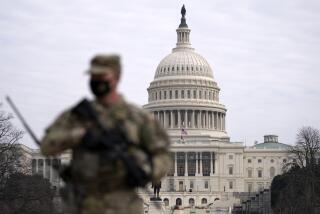Senate Supports Funding to Study ‘Bunker-Buster’
WASHINGTON — The Senate on Tuesday endorsed funding to study new kinds of nuclear bombs, despite objections that doing so would undermine U.S. efforts to promote nuclear nonproliferation around the world.
The action -- defeating a proposed amendment that would have cut the funding from the defense authorization bill -- came as the Senate attached to the same bill a long-debated measure to expand federal hate crime laws. A similar measure was endorsed by the House and the Senate in 2000, also as part of the defense bill, but it was stripped out of the legislation’s final version by congressional Republican leaders.
Siding with the Bush administration, the Republican-controlled chamber voted down a Democratic-led effort to cut $36 million for studying the new weapons, including a 100-kiloton nuclear “bunker-buster” capable of burrowing underground and destroying deeply buried targets where adversaries might conceal weapons and command centers. The vote against cutting the money was 55 to 42.
“We will make our nation, and our allies, less secure -- not more -- if the United States opens the door to the development, testing and deployment of new nuclear weapons,” Sen. Dianne Feinstein (D-Calif.) said in the debate.
Feinstein and Sen. Edward M. Kennedy (D-Mass.) led the effort to try to eliminate $27.6 million for study of the bunker-busters, also called “robust nuclear earth penetrators,” and $9 million for research on development of nuclear weapons, including low-yield bombs for use against smaller targets.
The programs are part of a bill that would authorize $447 billion for Pentagon programs for the 2005 fiscal year, which begins Oct. 1. The House bill includes funding for the programs, virtually ensuring that they will remain in the final version of the legislation authorizing that money be spent.
But a battle is expected when it comes time for the House and Senate negotiators to appropriate money. A House Appropriations subcommittee voted to delete funding for the weapons program, but its Senate counterpart was expected to approve it.
In arguing against the funding, Kennedy told his colleagues: “Our goal is to prevent nuclear proliferation. How does it help for us to start developing a new generation of nuclear weapons?”
Supporters said the funding was critical to ensuring the country’s security after Sept. 11.
Sen. John Cornyn (R-Texas) urged his colleagues not to “blind ourselves to emerging threats” from terrorists and rogue nations.
“It is not realistic to think that we can put the nuclear genie back into the bottle,” Sen. Pete V. Domenici (R-N.M.) added. “It is in our nation’s best interest to ensure that our nuclear weapons serve as a credible deterrent to a wide range of threats.”
Funding supporters said that it would be provided only for a study. But opponents said that unless funding was cut now, weapons would be developed, at a cost of more than $1 billion, setting off a new arms race.
Joining Feinstein in opposition was her California Democratic colleague, Sen. Barbara Boxer.
The hate crimes measure, which passed 65 to 33, would expand the law to cover acts of violence based on gender, sexual orientation and disability.
“Hate crimes tear at the very fabric of our nation. They seek to intimidate entire groups of Americans and divide our nation,” said Sen. Gordon Smith (R-Ore.), a sponsor.
A similar measure was endorsed by the House and the Senate in 2000, gaining ground after the 1998 killing of Matthew Shepard, a gay Wyoming college student who was beaten and left to die tied to a fence, and the 1999 shooting attack on a Jewish community center in the San Fernando Valley.
Conservatives opposed the measure, contending it was unnecessary. Feinstein and Boxer supported it.
More to Read
Get the L.A. Times Politics newsletter
Deeply reported insights into legislation, politics and policy from Sacramento, Washington and beyond. In your inbox three times per week.
You may occasionally receive promotional content from the Los Angeles Times.











